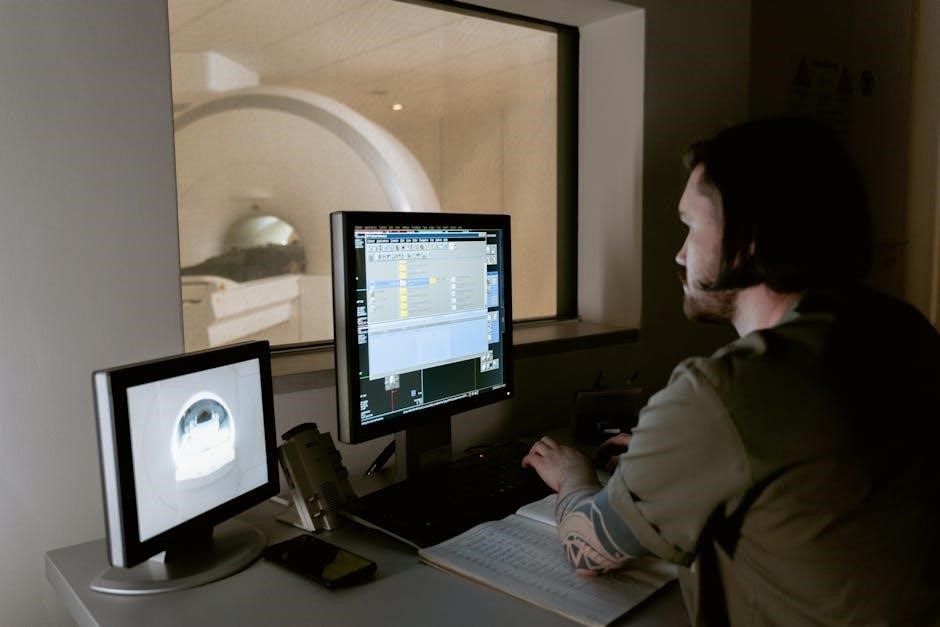brief cognitive assessment tool pdf
Brief cognitive assessment tools are essential for early detection of cognitive impairments, enabling timely interventions․ These instruments are designed to be time-efficient and easy to administer, making them invaluable in clinical settings for identifying potential issues quickly and accurately․
1․1 Importance of Cognitive Assessment in Healthcare
Cognitive assessments are crucial for identifying impairments early, enabling timely interventions and improving patient outcomes․ They guide diagnosis, treatment planning, and monitoring of conditions like dementia or stroke․ Brief tools like BCAT are invaluable in busy clinical settings, ensuring efficient detection of cognitive issues without compromising accuracy or patient care quality․
1․2 Overview of Brief Cognitive Assessment Tools
Brief cognitive assessment tools are designed for quick and effective detection of cognitive impairments in clinical settings․ They evaluate memory, executive functions, and attention, enabling early identification of issues․ These tools are versatile, used across various healthcare environments, and support timely interventions, making them essential for improving patient outcomes and enhancing care quality․

What is the Brief Cognitive Assessment Tool (BCAT)?
The BCAT is a concise, evidence-based tool designed to evaluate cognitive functions like memory, attention, and executive skills․ It is widely used in clinical settings to assess cognitive impairments efficiently and provide actionable insights for patient care․
2․1 Purpose and Scope of BCAT
The primary purpose of the BCAT is to quickly and accurately identify individuals with potential cognitive impairments․ Its scope includes assessing memory, executive functions, and attention, providing a comprehensive yet brief evaluation․ Designed for clinical settings, the BCAT aids healthcare professionals in making timely decisions regarding further assessments or interventions, ensuring optimal patient outcomes through early detection and management․
2․2 Key Components of the BCAT
The BCAT evaluates contextual memory, executive functions, and attentional capacity, providing a structured approach to cognitive screening․ It includes sections like Immediate Story Recall and Cognitive Shifting, with scoring based on performance thresholds․ The tool emphasizes practical application, ensuring clinicians can quickly identify impairments and guide further assessments or interventions effectively․

Reliability and Validity of BCAT
BCAT demonstrates strong reliability and validity as a cognitive assessment tool․ It consistently measures cognitive functions across administrations and accurately identifies impairments, ensuring dependable results for clinical decisions․
3․1 Understanding Reliability in Cognitive Assessments
Reliability in cognitive assessments refers to the consistency and accuracy of test results across repeated administrations․ Tools like BCAT demonstrate strong test-retest reliability, ensuring consistent measurements over time․ High inter-rater agreement further validates their dependability, minimizing variability in scoring․ This consistency is crucial for accurately tracking cognitive changes and making informed clinical decisions, ensuring reliable outcomes in diverse patient populations and settings․
3․2 Validity of BCAT in Detecting Cognitive Impairment
The BCAT has demonstrated strong validity in identifying cognitive impairments, accurately detecting issues in memory, executive functions, and attention․ Its ability to distinguish between mild and more severe impairments makes it a valuable tool in clinical practice․ Validity is further supported by its alignment with other established assessments, ensuring comprehensive and accurate detection of cognitive deficits across diverse patient populations and settings effectively․
Advantages of Using BCAT
The BCAT offers time efficiency in clinical settings and ease of administration, making it a practical choice for healthcare professionals to assess cognitive impairments quickly․
4․1 Time Efficiency in Clinical Settings
The BCAT is designed to be brief, enabling quick administration in clinical environments․ Its streamlined structure allows healthcare providers to assess cognitive function efficiently, saving valuable time while maintaining accuracy․ This makes it particularly suitable for settings where rapid patient turnover is common, ensuring timely referrals and interventions without delaying other critical tasks․
4․2 Ease of Administration and Scoring
The BCAT is designed for straightforward administration, requiring minimal training for healthcare providers․ Its clear instructions and structured format ensure consistency across assessments․ Scoring is simple and quick, with well-defined criteria to minimize subjectivity․ Additionally, the tool’s availability in both paper and digital formats, along with online scoring resources, further enhances its practicality in clinical settings․
Challenges and Limitations of BCAT
Despite its efficiency, BCAT may exhibit cultural biases and require additional informant scores, potentially leading to variability in interpretation and limiting its universal applicability․
5․1 Potential Biases and Cultural Considerations
The BCAT may exhibit cultural biases due to its reliance on specific cognitive tasks, potentially affecting individuals from diverse backgrounds․ Cultural insensitivity in test design and varying educational levels can skew results, necessitating careful adaptation for different populations․ Additionally, the tool’s reliance on informant scores may introduce variability, highlighting the need for culturally sensitive administration and interpretation to ensure accurate and fair assessments across all demographics․
5․2 Interpretation of Results and Clinical Judgment
Interpreting BCAT results requires skilled clinical judgment, as scores alone may not fully capture cognitive nuances․ Clinicians must consider the patient’s educational background, cultural context, and test conditions․ Results should not be viewed in isolation but as part of a comprehensive assessment․ Accurate interpretation ensures appropriate next steps, balancing sensitivity and specificity to avoid overdiagnosis or underdiagnosis of cognitive impairments․

How to Use BCAT in Clinical Practice
Administer BCAT in a quiet, comfortable setting, ensuring optimal patient focus․ Provide clear instructions and score responses according to guidelines․ Interpret results with caution, considering clinical context and patient history to inform accurate diagnostic decisions and treatment plans․
6․1 Step-by-Step Administration Guidelines
Begin by ensuring a quiet, comfortable environment for the patient․ Provide clear instructions for each task, emphasizing the importance of answering to the best of their ability․ Administer sections sequentially, starting with orientation and proceeding through memory recall and cognitive shifting․ Score each response according to predefined criteria, with specific point allocations for accuracy and completeness․ Ensure all instructions are delivered consistently to maintain reliability and validity in assessments․
6․2 Interpreting Scores and Determining Next Steps
Interpret BCAT scores by comparing them to the maximum points per section, such as 8 for immediate story recall․ Lower scores may indicate cognitive impairment․ If the total score is below the cutoff, consider further evaluation․ Clinical judgment is crucial, as scores alone may not capture the full clinical picture․ Use results to guide referrals for comprehensive assessments or specialized care, ensuring timely interventions for patients with concerning scores․
Comparison with Other Cognitive Assessment Tools
BCAT stands out for its focus on contextual memory and executive functions, offering a concise yet comprehensive assessment compared to tools like MoCA and Mini-Cog․
7․1 MoCA (Montreal Cognitive Assessment) vs․ BCAT
While both MoCA and BCAT are validated tools for cognitive screening, MoCA is more comprehensive with a 30-point scale, assessing multiple domains․ BCAT is shorter, focusing on contextual memory and executive functions, making it quicker for primary care settings․ MoCA is often considered the gold standard for detecting mild impairments, whereas BCAT emphasizes brevity and practicality, catering to time-limited clinical environments․
7․2 Mini-Cog and GPCOG as Alternative Screening Tools
Mini-Cog and GPCOG are widely used as brief screening tools for cognitive impairment․ Mini-Cog combines a clock-drawing test with a three-word recall, providing quick results․ GPCOG includes both patient and informant assessments, enhancing accuracy․ Both tools are valued for their simplicity and effectiveness in primary care settings, often serving as first-step screenings before more detailed assessments like MoCA or BCAT, ensuring efficient patient evaluation․
Case Studies and Practical Applications
Real-world case studies demonstrate BCAT’s effectiveness in identifying cognitive impairments․ Practical applications in clinical settings highlight its utility in guiding timely interventions and improving patient care outcomes․
8․1 Real-World Examples of BCAT Implementation
Examples include BCAT’s use in primary care to quickly identify cognitive impairments in elderly patients․ In geriatric settings, it has successfully detected early signs of dementia, enabling timely interventions․ Additionally, BCAT has been implemented in stroke rehabilitation programs to assess cognitive recovery and guide personalized treatment plans, demonstrating its practical value in diverse clinical scenarios․
8․2 Patient Outcomes and Clinical Decisions
BCAT has improved patient outcomes by enabling early detection of cognitive impairments, facilitating timely interventions․ Clinicians use BCAT results to guide decisions, such as referrals to specialists or the initiation of targeted therapies․ In geriatric care, BCAT has helped tailor care plans, enhancing quality of life for patients with cognitive decline by addressing specific needs early in treatment․

Future Directions and Innovations
Future innovations include the digital adaptation of BCAT, enhancing accessibility and efficiency․ Integration with emerging technologies promises improved accuracy and broader application in diverse clinical settings․
9․1 Digital and Online Versions of BCAT
Digital versions of BCAT aim to enhance accessibility and efficiency․ Online platforms allow for remote administration, reducing barriers for patients in remote areas․ Automated scoring and real-time results improve accuracy and streamline clinical workflows․ These innovations ensure that BCAT remains a cutting-edge tool for cognitive assessment, adapting to the evolving needs of modern healthcare․
9․2 Integration with Other Assessment Tools
Integrating BCAT with other tools like MoCA or Mini-Cog enhances comprehensive cognitive evaluation․ This approach allows clinicians to cross-validate findings, ensuring a more accurate assessment․ By combining BCAT’s focus on contextual memory with other tools’ strengths, healthcare providers can gain a broader understanding of cognitive function, supporting more informed clinical decisions and personalized care strategies․
The BCAT is a valuable tool for detecting cognitive impairments, offering efficiency and accuracy in clinical settings․ Its integration with other assessments enhances diagnostic precision, aiding in tailored care strategies․
10․1 Summary of Key Points
The BCAT is a reliable, efficient tool for detecting cognitive impairments, emphasizing contextual memory and executive functions․ Its brief nature makes it ideal for clinical settings, ensuring timely interventions․ The tool is adaptable, with a short form for quick assessments, and is culture-fair, reducing biases․ It complements other assessments, aiding in comprehensive evaluations․ Clinical judgment remains crucial for interpreting results, ensuring personalized care and effective outcomes in healthcare settings․
10․2 Final Thoughts on the Role of BCAT in Healthcare
The BCAT emerges as a valuable tool in healthcare, offering efficient and reliable cognitive assessments․ Its adaptability and brevity make it ideal for early detection and intervention, supporting timely clinical decisions․ By integrating with other tools, BCAT enhances comprehensive care, proving indispensable in modern healthcare for addressing cognitive impairments effectively․
